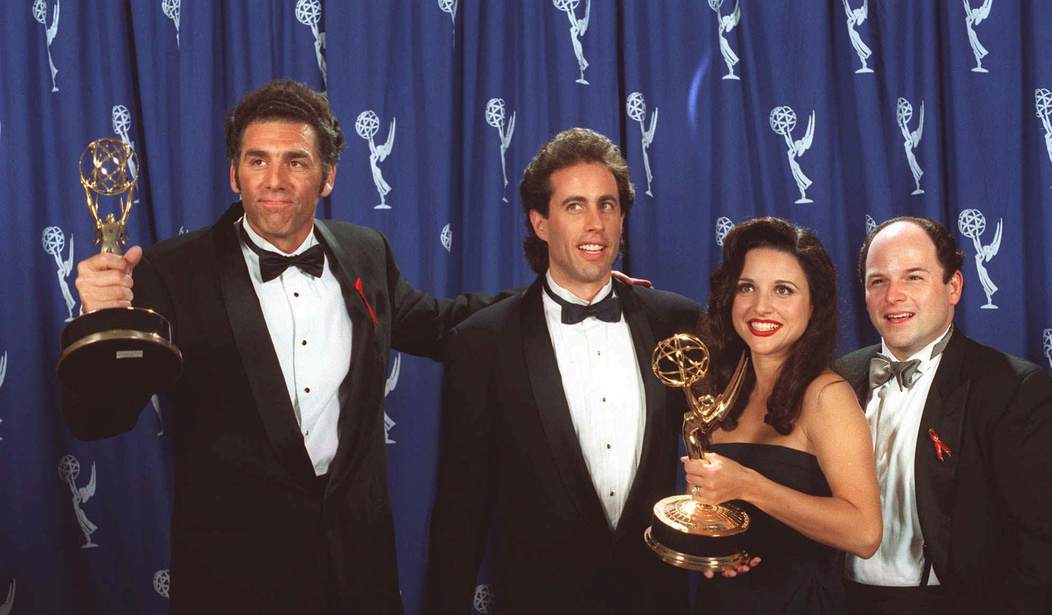The summer between my sophomore and junior years of high school, I remember seeing a few commercials for an upcoming special called “The Seinfeld Chronicles.” I was familiar with Jerry Seinfeld’s stand-up comedy, so I figured a sitcom pilot featuring his humor would be fun to watch.
“The Seinfeld Chronicles” aired for the first time 35 years ago, on July 5, 1989. I don’t remember if I caught it when NBC first ran it that night or if my first time seeing it was when the network ran it for a second time in early 1990, but I was hooked.
'Seinfeld' premiered on this day 35 years agohttps://t.co/DKDV9gBuTg
— Famous Birthdays (@FamousBirthdays) July 5, 2024
Even though the pilot was markedly different from the rest of the show — Kramer was the listless “Kessler,” George was a know-it-all who almost came across as cocky, and Elaine wasn’t a character at all — “The Seinfeld Chronicles” marked the advent of a new kind of television humor. TV comedy would never be the same.
Before “The Seinfeld Chronicles,” sitcoms largely centered around families and workplaces. “Seinfeld” changed all that and shifted the sitcom dynamics to groups of friends and how they hung out. Shows like “Friends” and “Living Single” came in its wake.
The show began to find its footing after adding Julia Louis-Dreyfus as Elaine. George became a more foible-ridden character, riddled with self-doubt, while Michael Richards developed his own characterization for Kramer. By the second season, episodes like “The Jacket” and “The Pony Remark” became instant classics.
Flashback: The 10 Funniest Episodes of Seinfeld
The show continued to improve in the ratings and got more daring with episodes like “The Chinese Restaurant” and “The Library.”
But nothing could top the show’s fourth season, which included the show’s only long-term story arcs: NBC invites Jerry and George to pitch a show, George has an on-again-off-again relationship with NBC exec Susan, NBC's head of programming falls for Elaine, and Crazy Joe Davola terrorizes the whole gang. That brilliant season was a high-water mark for television comedy as a whole, and it culminated in the hour-long episode "The Pilot."
The five seasons that followed were hit-or-miss but mostly funny. We witnessed brilliant moments like George's doomed engagement to Susan, Jerry wearing the "puffy shirt," Kramer's attempts to bust an accountant that the gang believes is abusing drugs, and Elaine becoming the personal assistant of an eccentric Englishman. The show also got away from Seinfeld's stand-up routines, which gave the writers the opportunity to write longer scripts.
Over nine seasons, we met memorable recurring characters, and the actors who played those roles were welcome additions to the cast. Who can forget Jerry's parents, George's parents, Uncle Leo, David Puddy, "Dentist to the Stars" Tim Whatley, and, of course, Newman?
"Seinfeld" ended with an uneven finale, but we still have nine seasons of unparalleled comedy to remember it by. It's still a cultural phenomenon, with catchphrases and situations that will live on forever.
I never bought the idea that "Seinfeld" was a "show about nothing." I called it a show about everything — which Richards also asserted in his recent memoir — and my brother has always insisted that it was a show about language because of how terminology and etiquette seemed to loom large over the show's conversations and situations. Whatever you think of it, "Seinfeld" is an undeniable cultural touchstone, and there'll never be anything like it again.










Join the conversation as a VIP Member